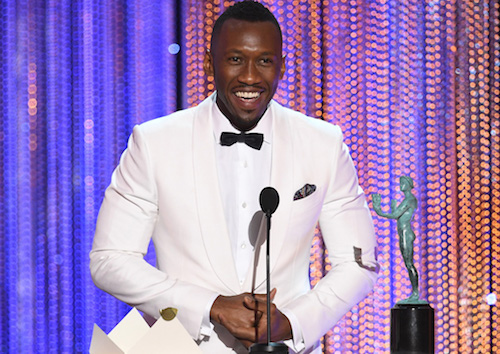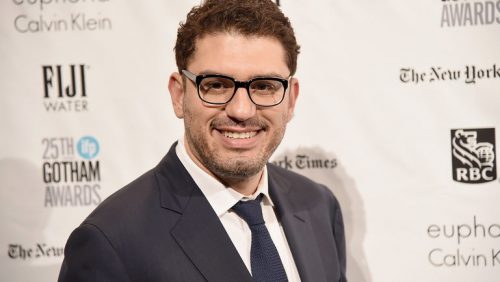
When Donald Trump signed an executive order barring travelers from seven predominantly Muslim countries from entering the United States, Hollywood reacted with outrage and disgust. Many of its stars took to social media to condemn their president and his decree, and others joined demonstrators at national airports demanding the release of the detained visitors, while the SAG awards ceremony was turned into a political stage, where celebrities rallied to support Muslims in impassioned speeches.
The stars backed their words and slogans with their pockets, making generous donations to the American Civil Liberties Union (ACLU), the non-profit organization that mounted a legal challenge to Trump’s order and succeeded in temporarily halting it.
Though heartened, Muslims were surprised and overwhelmed by the entertainment industry’s passionate support of their cause. After all, this is an industry that has been stereotyping and vilifying them in its movies for over a century. Muslim characters are usually the terrorists and evildoers, and very rarely seen in meaningful roles, let alone lead ones.
Interestingly, sixteen years ago, Hollywood did little to stem the surge of Islamophobia following the 9/11 terrorist attacks on Washington and New York. Instead, it joined forces with the Government in reassuring the anxious American people by offering jingoistic movies, in which American heroes decimated villainous Muslims, reaffirming and perpetuating the preconceived prejudice that all Muslims were terrorists. So why is Hollywood now defending the same people that it has contributed to vilifying in the first place?
This is not the first time that Hollywood’s attitude towards a vulnerable community has changed over time. Looking back at its history, we find that Hollywood’s moral codes are governed by business and political interests and aligned with public taste and sentiment.
During the 1930’s, when anti-semitism among Americans was rife, and the US authorities were refusing Jewish refugees entry to the US and turning them back to Europe, where they were murdered by the Nazis, Hollywood didn’t rally to support the Jews. Some historians even suggested that it was in bed with the Nazis, conforming to their racist agenda in order to secure access to the German market. Hitler had a representative in Tinseltown to ensure that movies were sympathetic to his agenda and were sterilized of Jewish characters. Only when the US joined the war did Hollywood change its course, portraying the Nazis as the villains and giving the Jews the good heroic roles. It’s no doubt that the positive depiction of Jews in the movies has made a dramatic impact on diminishing antisemitism in the US.
In recent years, similar shifts have occurred in Hollywood’s attitude towards other groups such as the African Americans and the LGBT community, whose members are now occupying lead roles in mainstream cinema such as “Brokeback Mountain” and “Carol” – something that was unimaginable twenty years ago. The normalization of LGBT community members in TV shows and movies over the last two decades made them acceptable to society and paved the way to legalizing same-sex Marriage in 2014. Similarly, the surge of African-American stories in mainstream cinema shed a new positive light on their community that had often been depicted as a burden on society and a source of crime.
The question is why does it take so long for such a liberal entity as Hollywood to change its ways?
Calling Hollywood liberal is not wholly accurate because if we look closely at its structure we find that it consists of two parts: the creative (the talent) and the corporate (the executives). While the former is indeed liberal in its political and social views, the latter is more conservative in its ways of thinking. And since the creative part is what the public sees and hears one gets the impression that Hollywood is indeed liberal, but in reality it’s the corporate part which makes the decisions in this town and dictates its rules.
In the 1930’s, Hollywood was swarming with Jewish creative talent, who did try to challenge Hollywood’s friendly policy towards the Nazis but they were thwarted by the powerful executives, many of them were also Jews. Most notably was screenwriter Herman J. Mankiewicz, who was prevented from making a movie about the Nazis treatment of the Jews.
Gay and African American artists’ attempts to tell their stories had also faced an impenetrable wall of rejections. Not because the executives were racists or homophobes, but simply because they couldn’t see the business logic behind telling those stories. They had firmly believed that the public was not ready for them and hence would not be able to sell them. For corporate Hollywood, profitability comes before morality. “I was not hired to defend or spread ideals,” one studio boss once told me. “My job is the ensure that my company is profitable.”
And when the corporate part decides to steer Hollywood in a specific direction, the idealistic artists have no choice but to obey. Case in point, when the Chinese market began to expand rapidly in the last decade, the artists relented to the executives’ demand of inserting Chinese characters in their movies and portraying China in a positive light, even when their ideals collided with China’s policies on human rights or Tibet. Hollywood is so eager to please China, one can hardly hear any of its talent mentioning Tibet or the Dalai Lama these days.
The artists are not without power though. Over the last few decades, they have increasingly relied on independent cinema to project their idealistic vision of the world. Film festivals, such as Sundance, acted as a publicity platform for these independent movies and a springboard to winning Academy awards, bringing them closer to the mainstream. Sundance winners, such as Desert Hearts, The Hurricane, Pariah, The Birth of A Nation and Fruitvale Station highlighted the issues of LGBT and African Americans, while their subsequent success piqued corporate Hollywood’s interest in their subjects, resulting in the formation of offshoot entities such as Fox SearchLight by 20th Century Fox and Focus Features by Universal that concentrate on making and distributing such movies.
The recent surge in TV productions and broadcasters, including Cable and Web Streaming, has also offered artists a new avenue to explore diverse issues that were impossible to touch in mainstream Hollywood. Shows such as Modern Family, Six Feet Under, Orange is the New Black, Empire and Black-ish brought the issues of diversity and racial and gender equality to people’s living rooms, breaking societal taboos and demolishing false prejudices.
So one could argue that independent cinema and TV has leveled the ground for corporate Hollywood to take a different path in its attitude towards these communities. Though, political events have also contributed to this change. The election of a liberal black president in 2008, has no doubt signaled to Hollywood that the multitudes were ready to accept blacks in its movies while his display of sympathy for the LGBT left Hollywood with no choice but to follow suit.
It seems that it’s Muslims’ and Middle Easterners’ turn to get similar treatment from Hollywood. In the last few years, decent Muslim characters started to pop up in TV shows, such as the ones played by Yasmine Al Masri in Quantico and Riz Ahmed in The Night Of. Muslim and Middle Eastern artists are winning Emmys and Golden Globes in TV, such as Mr. Robot’s creator, Sam Esmail, and star Rami Malik and Master of None’s Aziz Ansari. This year, the most talked about film at Sundance Film Festival was Kumail Nanjiani’s romantic comedy “The Big Sick,” about an interracial couple: a Muslim man a white woman. The film sparked a bidding war among buyers, and was sold to Amazon studios for $12 million, in one of the biggest deals in the festival’s history.
Sundance has also screened four documentaries highlighting the plight of the Syrian people. One of them, Last Men in Aleppo was honored with the Grand Jury Award for the Best International documentary. Meanwhile, three short documentaries about the same subject have been nominated for Academy Awards.
Like in the cases of other communities, it took a humanitarian crisis and anti-Islamic president to get to this point. Muslims artists are now embraced and applauded. This year’s Oscar-Nominated and SAG-winning actor, Mahershala Ali, was rewarded with a warm applause when he spoke about his Islamic faith last month at the SAG awards ceremony, while Iranian Oscar-nominated director, Asghar Farhadi, was showered with support and praise following the announcement of Trump’s executive order, that prevented him from attending the Oscars ceremony. Just a few months earlier, Farhadi told me that “Hollywood’s conception of the Middle East is detached from reality,” and hence he couldn’t work there.
With such passionate support for Muslims, on social and mainstream media and from other businesses,

corporate Hollywood has no choice but to react and start ameliorating its portrayal of Muslims in its movies. This change is not being spurred by moral obligation but by commercial necessity. Trump’s Executive Order created a sense of acceptance, respect and inclusion of Muslims. Hence, the public will more willing to hear and see their stories on the big screen. “Four years ago, no one wanted to hear about my Muslim stories. “Now they are seeking them out,” say Sam Esmail, who is working on a Middle Eastern project.
The question is: Will Hollywood’s movies be able to polish the tainted image of Muslims in the US, when Washington is determined to label them as potential terrorists? Former Vice president, Al Gore believes that film is more powerful than politicians in affecting the consciousness of people and shifting their views on issues. “The power of cinema to open people’s minds and put before them issues of importance to humanity, is unparalleled.” he told me at Sundance Film Festival a couple of weeks ago, where he was promoting his second environment documentary “The Inconvenient Sequel.”
Of course Hollywood doesn’t have an absolute power on people’s minds and feelings. In spite of its efforts to empower marginalized communities, anti-Semitism, homophobia and racism are still alive in the US and other countries. Denzel Washington, whose movies have shed light on so many African American virtues, told me in a BBC interview: “You can’t legislate love. If you go home and teach your son to hate, then nothing can stop you.”